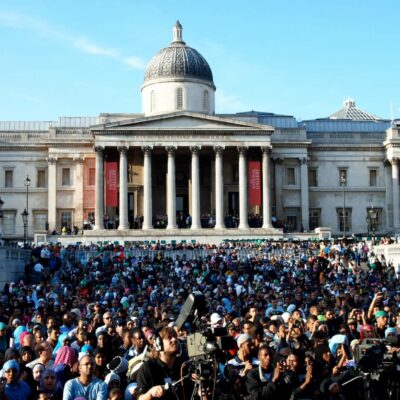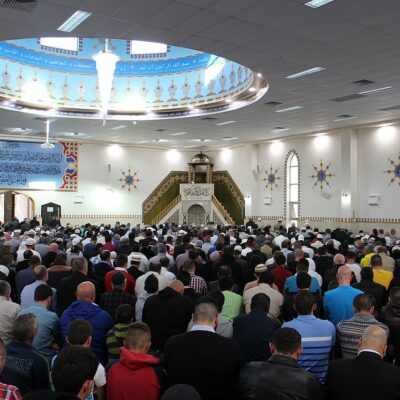What Muslims and non-Muslims think about Islam matters for peaceful interreligious relations. Islam is predicted to be the world’s most followed religion by the latter half of this century, surpassing Christianity for the first time. So far this century, the world’s fastest growing religion has been viewed by many non-Muslims with antipathy and fear, often in reference to historic conflicts between Muslim and Christian empires and in response to more recent acts of violent extremism and terrorism. The centrality of fulfilling covenants and treaties in Islam has been understated in discourses about Islam, yet it is mentioned in the Qur’an alongside the religion’s most central tenets including belief in God and the Day of Judgement, prayer and charity to define righteousness (Q2:177) and the characteristics of a believer (Q23:2-9). This article looks at covenants in the Qur’an and historic documents, that recent research indicates were issued by the Prophet Muhammad (d. 632) to Christian and other communities of his time, to offer some deeper insights into interreligious relations in Islam.
The dominant narrative
Politically and ideologically motivated violence by Muslim and far-right extremists is done in the name of, and in opposition to, Islam respectively. The association of Islam and the Prophet Muhammad with violence and enmity towards non-Muslims is not confined to the views of extremists but also disseminated through social media posts, cartoons published by influential media organisations, news articles, and even academic scholarship. A 2019 report by The Guardian newspaper into the world’s most used social media platform, Facebook, found that an Israel-based network coordinated the dissemination of anti-Islam posts that ‘stoke deep hatred of Islam across the western world and influence politics in Australia, Canada, the UK and the US by amplifying far-right parties’. Radicalisation researcher Tahir Abbas observes that the far-right has seen a shift ‘away from Nazism, fascism and anti-Semitism’ to define its cause as a ‘defence against the perceived threat from Islam’.
Anders Breivik, the convicted terrorist responsible for the 2011 Oslo attacks that killed 77 people, asserted in his 1516-page manifesto, 2083: A European Declaration of Independence, that the true history of Islam is a ‘1400-year jihad’ against non-Muslims. Breivik was an inspiration for the Australian terrorist, Brenton Tarrant, convicted for the 2019 Christchurch mosque shootings that left 51 Muslims dead and 40 injured. In his 74-page manifesto, The Great Replacement: Towards a New Society, Tarrant stated that his attack was ‘for revenge against islam [sic] for the 1300 years of war and devastation that it has brought upon the people of the West and other peoples of the world’.
One may be able to dismiss such claims as the propaganda of convicted terrorists if they were not reinforced by ostensibly reputable journalists and academics. For example, in The Atlantic article, ‘What ISIS Really Wants’, author Graeme Wood contends that ‘the Islamic State is Islamic. Very Islamic. Yes, it has attracted psychopaths and adventure seekers, drawn largely from the disaffected populations of the Middle East and Europe. But the religion preached by its most ardent followers derives from coherent and even learned interpretations of Islam’.
Even more concerning (due to the higher standards expected from academics) is that such views also pass as academic scholarship. Samuel Huntington’s influential Clash of Civilizations theory claims that conflict between ‘Islamic’ and ‘Western’ countries is inevitable as demonstrated by ‘[f]ourteen hundred years of history’, specifically ‘the continuing and deeply conflictual relation between Islam and Christianity’. According to Huntington, the problem the West faces is not from ‘violent Islamist extremes’ but ‘Islam’ itself as the religion is inextricably linked to militarism; that ‘Islam’s borders are bloody, and so are its innards’. More recently published academic articles also contend that militarism is ‘firmly rooted’ within the Islamic tradition, dismissing scholarship on the defensive nature of jihad as ‘apologetic’, and that Islam is ‘positively correlated’ with suicide attacks, while omitting from the analysis how geopolitical factors, illegal invasions and occupations, and violations of human rights and international humanitarian law have contributed to the emergence of militant groups in Muslim-majority countries.
Muslims disagree
The dominant narrative which sees Islam as violent and intolerant of non-Muslims is not shared by the majority of Muslims, including Muslim Australians. A national survey of Muslim Australians found that 93.3 percent strongly agreed or agreed that ‘someone who dies attacking innocent civilians is not a martyr’, 89.5 percent said ‘Islam never permits armed conflict against civilians/non-combatants’ and less than one per cent agreed that ‘Islam generally permits armed conflict against civilians/non-combatants’. Additionally, 92.2 percent of the survey respondents said that ‘engaging with non-Muslims as family, friends, colleagues and in general social interaction’ is ‘normal and good’. Less than one percent said that such engagement with non-Muslims is discouraged or forbidden in Islam.
In response to the ISIS leader Abū Bakr al-Baghdādī declaring a caliphate in June 2014, Muslim leaders and scholars worldwide issued an Open Letter to al-Baghdādī and ISIS fighters and followers that addresses various aspects of the group’s interpretation and implementation of ‘Islam’, including the treatment of non-Muslims under its rule. In section 10, titled ‘People of the Scripture’, the Open Letter states:
From the legal perspective of Shari’ah they all fall under ancient agreements that are around 1400 years old, and the rulings of jihad do not apply to them. Some of their ancestors fought alongside the Prophet’s army against the Byzantines; and thus have been citizens of the State of Medina since that time. Others are under agreements that were guaranteed to them by Omar ibn Al-Khattab, Khalid ibn Al-Walid, the Umayyads, the Abbasids, the Ottomans and their respective states.
It is noteworthy that the Open Letter refers to ‘ancient agreements’ that guaranteed the protection of non-Muslims. Examination of such agreements, including covenants and treaties mentioned in the Qur’an and hadith (narratives attributed to Prophet Muhammad) literature, has received increasing attention from scholars of Islamic studies in recent years.
Islamic studies
The field of Islamic studies has two main camps of scholars: traditionalists and revisionists. For most of its history, the field has been led by the traditionalists who accept the traditional Muslim account of the origins and history of Islam, life of Prophet Muhammad, and compilation of the Qur’an. The traditional Muslim account is problematic, however, especially for historians, as it largely relies on literary sources rather than documents, archeological and other material evidence.
The extant literary sources, including sira (biographical accounts of Muhammad’s life) and hadith, were compiled centuries after the time they purport to describe and contain numerous inconsistencies, including with the Qur’an, the preeminent text of Islam. Recent empirical research and analysis has placed the origins of the Qur’an in the lifetime of the Prophet Muhammad and affirmed the stability of the text since that time, thereby reaffirming its reliability as the standard by which all other information about Islam should be assessed.
Although many of the revisionists’ claims have been disproven, such as the Qur’an being of later origin, they have had a lasting impact on the field by forcing an emphasis on documentary evidence over literary sources. This has encouraged a renewed focus on the Qur’an and documents attributed to the Prophet Muhammad, including the Constitution of Medina, Treaty of Hudaybiyya, Covenant with the Monks of Mount Sinai and Covenant with the Christians of Najran among others, to reconstruct and reexamine the early message of Islam, including its position on interreligious relations.
A theory of covenants in Islam
There are a few notable studies of covenants in the Qur’an, such as those by Rosalind Ward Gwynne, Tariq Jaffer, Joseph Lumbard, and Andrew O’Connor. However, as noted by these studies, notwithstanding the extensive references in the Qur’an to covenants and treaties (‘ahd and mīthāq in Arabic), a theory of covenants in Islam was not developed by either the classical or modern scholars of Islam. The Qur’an contains 80 references to ‘ahd and mithaq in various grammatical forms as well as other related terms including dhimma (covenant of protection), ‘aqd (contract), aymān (oath), bay’a (pledge) and promise (wa’d). To give a sense of their importance to understanding Islam, Gwynne highlights that covenants are ‘the logical key to the entire structure of the Qur’anic argument’ and ‘[v]irtually every argument in the Qur’an expresses or implies one or more covenantal provisions’.
The Qur’an commands the fulfillment of covenants and treaties (e.g. Q17:34; Q16:91; Q5:7; Q8:72) and gives strict warnings against violating them (e.g. Q2:27; Q16:95; Q5:13; Q13:25). Covenants in the Qur’an encompass relationships between God and all human beings (e.g. Q7:172; Q5:7; Q57:8), God and the prophets (e.g. Q3:81; Q33:7-8; Q2:124-125), and God and people of scripture (e.g. Q2:83-84; Q5:12-14). The Qur’an also refers to covenants and treaties between Muhammad and people of his time, including the non-Muslim polytheists of the Quraysh tribe to which he belonged (e.g. Q8:55-58; Q8:72; Q9:1-7).
The main focus of the Qur’an concerns human existence and coexistence. Covenants and treaties in the Qur’an regulate relations for spiritual and material wellbeing and security. According to the Qur’anic narrative, the experience of earthly life—with its trials and treasures—is granted by God to all human beings to attain righteousness before accountability on the Day of Judgement and the afterlife. Through the covenants, humanity are reminded about God as Lord (Q7:172) and by which the life, property and religion of people are secured and protected (e.g. Q2:84, Q6:152, Q9:8-10). The covenant with the Children of Israel, for example, warns against shedding blood and driving people from their homes (Q2:84).
A reading of the verses concerning the early Muslims’ conflict with the Meccan polytheists through the nexus of covenants shows that fighting was not directed at non-Muslims in general, only those who violated their treaty. The Qur’an (Q9:4), recognising intra-group diversity, acknowledges that when the polytheists broke the Treaty of Hudaybiyya, this was not a unanimous decision among them. As such the Prophet was instructed to honour the treaty with those who upheld it (Q9:4), give protection to the polytheists who sought it (Q9:6), and to uphold the treaty made at the Sacred Mosque with those who remain true (Q9:7).
It is noteworthy that the Qur’an does not mention the Prophet Muhammad having a covenant or treaty with the Christian or Jewish communities of his time. This does not necessarily mean they did not exist. There are many references in the hadith literature to the Prophet’s covenants with other religious communities, in which he pledged to respect their faith and protect their places of worship as a religious obligation, that has been the focus of recent research. This does not necessarily prove their historicity either, but the case is becoming more compelling. While forgeries of letters ascribed to the Prophet Muhammad have been detected, research pointing to the authenticity of the Prophet’s covenants has been published in respected academic journals including the Oxford Journal of Islamic Studies, Islam and Christian-Muslim Relations, and Religions among others.
Most recently, scholars Ibrahim Zein and Ahmed El-Wakil have advanced the case for the historicity of the Prophet’s covenants through their comparative textual and linguistic analysis of covenant manuscripts with recensions of the Siffin Arbitration Agreement between the Prophet’s two covenantal scribes, Ali bin Abi Talib (d. 661) and Mu’awiya bin Abi Sufyan (d. 680). References to covenants and early treaties appear in Muslim and non-Muslim literary sources, while copies of these documents have been preserved in archives, manuscripts, monasteries and other places of worship of those to whom the originals were purported to be issued, representing a shared historical memory. There are often multiple recensions of these documents, longer and shorter versions, with variations in their contents that do not significantly affect the main provisions but constitute acceptable ‘transmission nuances’ expected in the process of copying historic documents. Additionally, writings of Christians dated to the time of early Muslim rule in the Near East indicate they were treated in a way that reflected what we find in the Constitution of Medina and the covenants. That is, they were accepted as part of the society and polity and protected.
The Qur’an established respect for the diversity of creation (Q5:48; Q10:99), the principle of ‘no compulsion in religion’ (Q2:256), and even freedom to disbelieve in monotheism (Q109:1-6), with an overarching covenantal command for peaceful coexistence and security (Q8:61, Q4:90). It also established a religious obligation upon Muslims to protect lives and property, including non-Muslim places of worship (Q22:39-40). The Qur’anic reference to protecting monasteries [ṣwāmi‘], churches [biya‘], synagogues [ṣalwāt], and mosques [masājid] (Q22:40) mirrors the central provision found the Prophet’s Covenant with the Monks of Mount Sinai and Covenant with the Christians of Najran.
Contemporary importance of the Prophet Muhammad’s covenants
Before addressing the problem of far-right anti-Islam/anti-Muslim extremism using an alternative narrative based on a nexus of covenants, the value of the Prophet’s covenants among Muslims today should be contemplated. The acquittal of Aasiya Noreen (Asia Bibi) of blasphemy charges by the Pakistan Supreme Court is a case worth considering. Pakistan is a self-declared Islamic Republic and currently the second most populous Muslim-majority country in the world, with almost 230 million people, who in general strongly identify with Islam. Since the late 1970s, Pakistan has implemented what it refers to as shariah or Islamic laws and has experienced growing influence of the ulema or religious clerics on society and politics, which has contributed to interreligious tensions.
Aasiya Noreen (Asia Bibi), a Christian Pakistani woman accused of blasphemy in 2009, was convicted in 2010 and sentenced to death by hanging. She was charged and sentenced under Section 295-C of the Pakistan Penal Code, which pertains to ‘Use of derogatory remarks, etc. in respect of the Holy Prophet [Muhammad]’. Aasiya was subsequently acquitted in 2018 and after her release from prison in 2019 took asylum in Canada. The case attracted significant national and international attention and evoked strong reactions supporting and opposing Pakistan’s blasphemy laws.
Pakistani and international human rights groups highlighted the injustice of the blasphemy laws and mistreatment of Aasiya, while religious clerics and their followers strongly back the blasphemy laws and for Aasiya to be executed. Two Pakistan officials, Governor of Punjab Salmaan Taseer and Minority Affairs Minister Shahbaz Bhatti, who supported Aasiya and expressed opposition to the blasphemy laws, were assassinated in 2011. In reaction to Aasiya’s acquittal, large protests erupted in multiple Pakistani cities, roads were blockaded, property was damaged, and threats were made against Aasiya, her family and supporters and opponents of the country’s blasphemy laws. Multiple Western countries offered asylum to Aasiya and her family. The case was another shameful episode in which Islam appeared to the international community as inhumane and hostile, particularly towards non-Muslims. Her acquittal by the Pakistan Supreme Court highlights the relevance of the Prophet’s covenants for a contemporary understanding of interreligious relations in Islam.
In his acquittal judgement, Pakistan Supreme Court Justice Asif Saeed Khan Khosa emphasizes the centrality of justice in Islam, quotes the Qur’an (Q4:135), and also refers to the Prophet Muhammad’s covenant with Christians as a standard to which the court should adhere:
In view of the glaring contradictions in the evidence produced by the prosecution it has appeared to me to be equally plausible that due to the quarrel taking place between the appellant and her Muslim co-workers at the spot without any offending word having been uttered by the appellant the quarrel was reported by the Muslim ladies to others who then, after deliberating over the matter for five long days, had decided to go after the appellant with a false allegation regarding commission of blasphemy. If that were so then the Muslim witnesses in this case had violated a covenant of the Holy Prophet Muhammad (Peace Be Upon Him) with those professing the Christian faith.
Justice Khosa quotes extensively from the Covenant with the Monks of Mount Sinai (Saint Catherine Monastery) and notes its provisions in respect to interreligious relations:
The promise made was eternal and universal and was not limited to St. Catherine alone. The rights conferred by the charter are inalienable and the Holy Prophet Muhammad (Peace Be Upon Him) had declared that Christians, all of them, were his allies and he equated ill treatment of Christians with violating God’s covenant. It is noticeable that the charter imposed no conditions on Christians for enjoying its privileges and it was enough that they were Christians. They were not required to alter their beliefs, they did not have to make any payments and they did not have any obligations. The charter was of rights without any duties and it clearly protected the right to property, freedom of religion, freedom of work, and security of person.
He adds that ‘the above-mentioned promise made by the Holy Prophet Muhammad (Peace Be Upon Him) to those professing the Christian faith had not been adhered to by his followers in the present case’. This case is particularly significant as the Supreme Court of one of the world’s largest, most influential Islamic republics invoked a covenant of the Prophet, affirming his commitment to peaceful, respectful interreligious relations. Justice Khosa’s ruling not only suggests the court’s recognition of the historicity of the Covenant with the Monks of Mount Sinai but that the document is relevant today and expresses Islam’s expectation that a Muslim-majority state must protect its Christian citizens and treat them fairly and justly.
The prospects of intensified religious persecution and interreligious conflict this century are high given what has occurred over its first two decades. It is crucial that misinformation and prejudice are met with authentic, empirically-verified knowledge guided by principles of justice, compassion and wellbeing. The study of covenants in the Qur’an and between Prophet Muhammad and non-Muslims of his time offers an alternative narrative to long-held and widely shared notions of adversarial interreligious relations. Extremists such as Al Qaeda and ISIS do not represent Islam or Muslims and a clash of Islam and the West is not inevitable. Human beings of any religion or none may succumb to their grievances, greed, group solidarity or some other motivation by which they cause harm to others. There is certainly a case to be made, however, that the message of Islam, as enshrined in the Qur’an and covenants of Prophet Muhammad, sees humanity’s diversity as part of God’s creation and seeks to regulate interreligious relations through covenants and treaties as a means by which all people may experience their earthly existence in peace and security.
Image: Part of the domes of Hagia Sophia, Istanbul, Turkey. Credit: Osama Shukir Muhammed Amin FRCP(Glasg)/WikiCommons.




